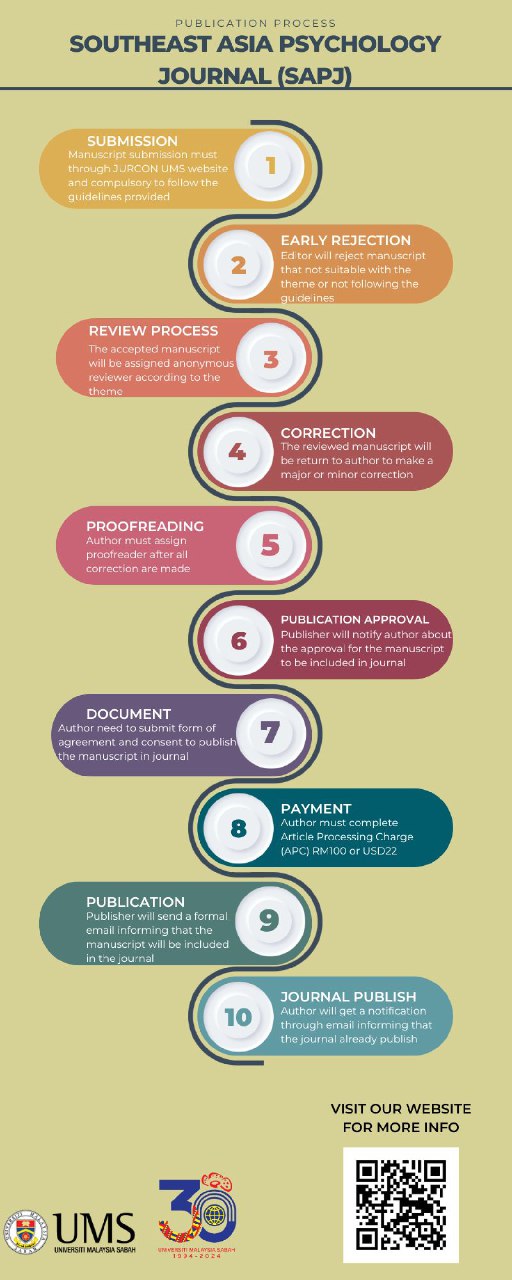PROCRASTINATION AND ANXIETY AMONG PSYCHOLOGY AND SOCIAL WORK STUDENTS IN A PUBLIC UNIVERSITY IN EAST MALAYSIA
DOI:
https://doi.org/10.51200/sapj.v7i3.5239Keywords:
Procrastination, Anxiety, Psychology, Social WorkAbstract
Procrastination is prevalent and pernicious but not entirely understood. It has been seen as a universal phenomenon that hinders people’s ability to accomplish their goals. Procrastination can be defined as lack or absence of self regulated performance and the behavioural tendency to delay what is necessary to reach a goal. It appears to be a troubling phenomenon and yet human beings
have been procrastinating for centuries. University students are the backbone of society. They need to be aware of their procrastination attitude so that they could tackle the problem. Anxiety on the other hand is a negative feeling. Studies show that a relationship exists between procrastination and anxiety. However very few studies investigate procrastination and anxiety, especially among
Psychology and Social Work students in the public university in Malaysia. In view of this, the objectives of this study are to examine: (1) the difference in procrastination by gender; (2) the difference in anxiety by gender; (3) the relationship between procrastination and anxiety. This study managed to get 304 samples for the objectives above. The difference of gender was tested by t-test; while the relationship between procrastination and anxiety was tested by correlation. The results of this study indicated that female students engaged more in major procrastination, whereas male students engaged more in moderate procrastination. However, there were no significant differences on procrastination and anxiety between gender. The finding also showed a significant relationship between procrastination and anxiety.
References
Corey, G. (2013). Theory and practice of counseling and psychotherapy. Belmont, CA: Brooks/Cole, Cengage Learning.
Ebadi, S., & Shakoorzadeh, R. (2015). Investigation of Academic Procrastination Prevalence and Its Relationship with Academic Self-Regulation and Achievement Motivation among High School Students in Tehran City. International Education Studies, 8(10), 193-199.
Ellis, Dave (2009). Becoming a master student. Boston: Houghton Miffin.
Freud, S. (1920). Beyond the pleasure principle. London: The Hogarth Press.
Kamran, W., & Fatima, I. (2013). Emotional Intelligence, Anxiety and Procrastination in Intermediate Science Students. Pakistan Journal of Social and Clinical Psychology, 1-6. Retrieved from http://www.gcu.edu.pk/FullTextJour/PJSCS/2013b/1.iramFatima.pdf.
Khan, M. J., Hafsa Arif, Syeda Sumbul Noor & Sidra Muneer. (2014). Academic procrastination among male and female university and
college students. FWU Journal of Social Sciences, 8(2), 65-70.
Krejcie, R. V., & Morgan, D. W. (1970). Determining sample size for research activities. Educational and Psychological Measurement, 30(3), 607-610.
Mandap, C. M. (2016). Examining the Differences in Procrastination Tendencies among University Students. International Journal of
Education and Research , 431-436.
McLean, Carmen T., Asnaani, A., Litz, B. T., & Hofmann, S. G. (2011). Gender differences in anxiety disorders: Prevalence, course of illness, comorbidity and burden of illness. Journal of Psychiatric Research, 1027-1035.
Siaputra, I. B. (2010). Temporal motivation theory: Best theory (yet) to explain procrastination. Anima Indonesian Psychological Journal, 206-214.
Spielberger, C.D. (1983). State-Trait anxiety inventory for adults: Manual, instrument and scoring guide. CA: Mind Garden, Inc.
Steel, P. (2007). The nature of procrastination: A meta-analytic and theoretical review of quintessential self-regulatory failure. Psychological Bulletin, 65-94.
Yerdelen, S. M. (2016). Longitudinal Examination of Procrastination and Anxiety, and Their Relation to Self-Efficacy for Self-Regulated
Learning: Latent Growth Curve Modeling. Educational Sciences: Theory & Practice, 5-22.








